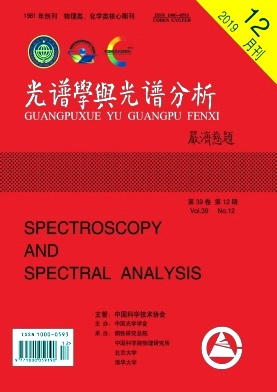光谱学与光谱分析, 2019, 39 (12): 3794, 网络出版: 2020-01-07
基于时序NDVI与光谱微分变换的森林优势树种识别
Classifying Forest Dominant Trees Species Based on High Dimensional Time-Series NDVI Data and Differential Transform Methods
树种识别 时序NDVI 微分变换 高分一号 支持向量机 Tree species classification NDVI time-series Differential transformation GF-1 Support vector machine
摘要
基于遥感光谱特征准确识别优势树种类型对于区域林业资源的监测和经营具有重要意义, 也是当前亟待解决的重要科学问题。 伴随遥感技术的发展, 利用时间序列高分影像能够有效获取林分树种不同物候期生长特性及其冠层光谱动态信息, 有利于克服区域森林类型精细识别中普遍存在的异物同谱难题。 以中国东北地区赤峰市旺业甸国有林场为试验区, 采用覆盖完整自然年的共36景高分一号(GF-1)WFV时间序列数据(16 m), 提取包含不同优势树种生长阶段特征的林分冠层光谱归一化植被指数(NDVI), 结合支持向量机(SVM)模型对研究区内5种典型优势树种: 油松、 落叶松、 山杨、 白桦和蒙古栎, 进行不同时间尺度下(单季相、 全季相、 逐月和逐旬)的光谱识别研究。 同时, 分别基于原始时序光谱及其一阶、 二阶和三阶微分变换结果, 探讨了不同分辨率时序NDVI光谱及其3种微分变换结果对区域森林优势树种的识别效果。 结果显示, 基于不同尺度的时间序列数据能够获得比不同季节单时相数据更好的树种识别结果(p<0.05), 其中采用全季相数据的树种总分类精度相比于春、 夏和秋不同季节的单季相数据结果, 分别提高了7.67%, 6.64%和3.6%, 表明时间序列影像中所包含的植被物候信息对于区分不同森林树种类型十分重要, 同时秋季是采用单时相数据的最佳识别季节(p<0.05); 在不同时间序列数据中, 基于逐旬的NDVI数据显著优于基于逐月和全季相数据的光谱识别结果(p<0.05), 而基于全季相数据的光谱识别结果最低(p<0.05), 表明更密集的时序光谱信息有利于区域树种类型识别精度的提升。 此外, 结合光谱微分变换后的树种识别结果比仅采用原始NDVI时间序列的识别结果精度更高(p<0.05), 其中基于逐旬和逐月时间分辨率数据的最高识别精度能够达到82.1%和78.74%, 分别提升了3.38%和2.95%。 研究表明采用基于全年逐旬或逐月尺度的时序光谱数据, 并结合相应的微分变换方法, 可以有效提高区域尺度优势树种的识别精度, 为相关多光谱森林植被精细识别研究提供参考。
Abstract
Ensuring the accuracy of forest trees species recognition based on remote sensing spectral detail information has strong practical significance and value in forestry resources monitoring and management, which is also an important scientific issue to be settled. The time-series remotely sensed data with high resolution can distinguish small canopy spectrum variation caused by different phenological growth characteristics of different forest tree species effectively, which is expected to solve the common problem of the isomorphism in multispectral recognition of tree species. To clarify this situation, we study the Wangyedian forest farm in Chifeng of Inner Mongolia, northeast China, by using a total of 36 scenes covering the whole year medium-high resolution satellite observations (at 16 m spatial resolution) which were supported with GF-1 WFV (wide field view) to extract various time series of NDVI reflectance data. The data contain all the seasonal phases and phenological growth stages of different tree species and are propitious for the fine recognition of forest types. Five dominant forest types of Pinus tabulaeformis, Larix gmelinii, Populus davidiana, Betula platyphylla, and Quercus mongolica forest were classified and recognized using Support Vector Machine (SVM) classifier at different time scales (single season, every quarter, month-to-month and every ten-days). We also explore the effects of different time scales of NDVI reflectance data and differential transformation methods on the recognition of regional forest dominant tree species, based on the original sequence spectrum and the first, second and third order differential transformation, respectively. The results showed that Autumn is the best single season to identify the dominant tree species in the study area (p<0.05), and the largely improved recognition accuracy of forest tree species can be obtained from different time series data than single season data across all different seasons (p<0.05). Compared with the single data of spring, summer and autumn, the overall accuracy (OA) based on the every quarter data improved, which increased by 7.67%, 6.64% and 3.6% respectively, indicating the importance of phenological information contained in time series data images for discriminating different forest types. Besides, the results of spectral recognition based on month-to-month and every quarter data were significantly lower than those based on every ten-days and every quarter (p<0.05), and the spectrum recognition results based on the whole seasonal phase were the lowest in these time series data (p<0.05), which showed that the denser time series spectral information is more beneficial to the improvement of the accuracy of regional tree species identification (p<0.05). In addition, combined appropriately with spectrum differential transformation increased classification accuracy using time series multispectral imagery (p<0.05), for the overall accuracy of tree species created with the combined data was higher than that from results of time series NDVI spectral alone in the study area. After combined with the optimal spectrum differential transformation method, the best overall accuracies occurred in every ten-days and month-to-month data were 82.1% and 78.74%, and the corresponding rates of increase reached 3.38% and 2.95%, respectively. The results indicated that adding spectral derivative analysis was more effective in improving the tree species recognition accuracy from every ten-days to month-to-month time series NDVI data (p<0.05), which provided an effective reference and foundation for related researches focusing on fine recognition of forest types with multispectral remote sensing.
徐凯健, 田庆久, 徐念旭, 岳继博, 唐少飞. 基于时序NDVI与光谱微分变换的森林优势树种识别[J]. 光谱学与光谱分析, 2019, 39(12): 3794. XU Kai-jian, TIAN Qing-jiu, XU Nian-xu, YUE Ji-bo, TANG Shao-fei. Classifying Forest Dominant Trees Species Based on High Dimensional Time-Series NDVI Data and Differential Transform Methods[J]. Spectroscopy and Spectral Analysis, 2019, 39(12): 3794.



